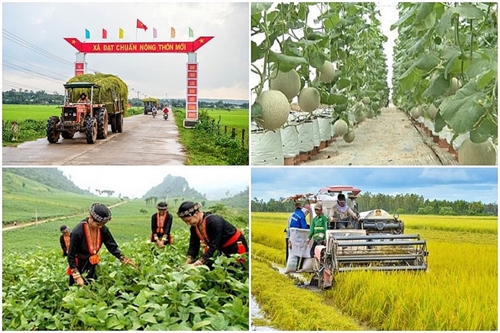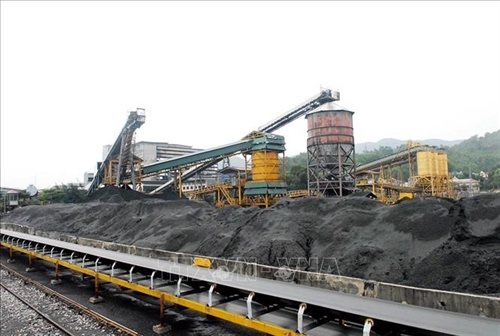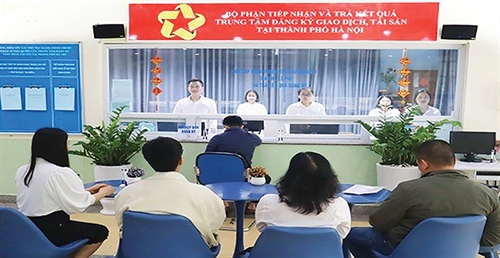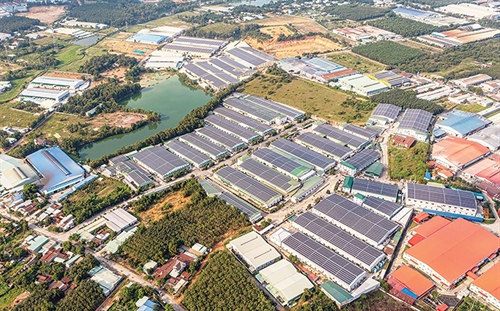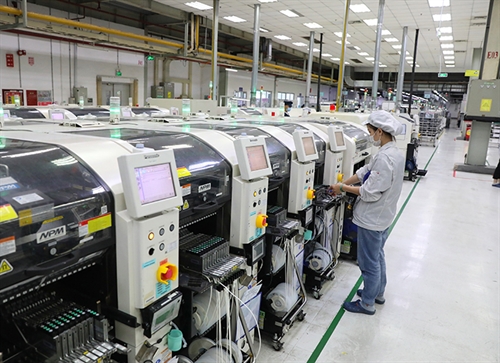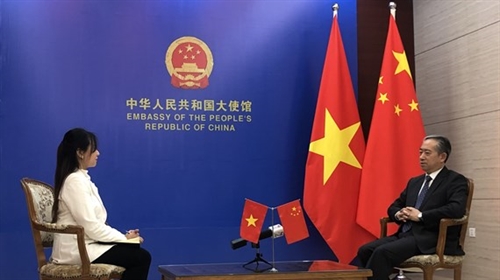In an interview with the Vietnam News Agency, Tang The Cuong, Director of the Department of Climate Change under the Ministry of Natural Resources and Environment, highlighted Vietnam’s significant involvement in and substantial contributions to the global effort in responding to climate change and affirming its commitment to climate change management and ozone layer protection.
Could you share the key milestones in Vietnam’s journey to address climate change?
Vietnam is among the countries most affected by climate change. In recognition of this, the Ministry of Natural Resources and Environment in 2008 established the Department of Hydrometeorology and Climate Change (now the Department of Climate Change) to enhance the state management of hydrometeorology and climate change, meeting practical requirements.
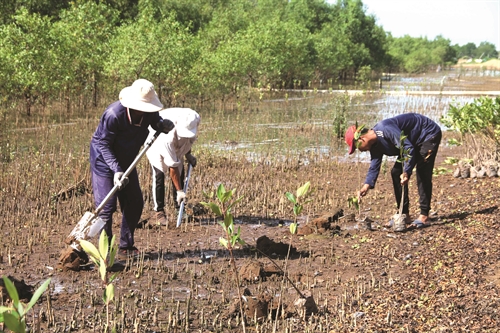 |
| Planting forests in My Long Nam commune, Cau Ngang district, Tra Vinh province__Photo: Thanh Hoa/VNA |
From 2008 to 2013, authorities in charge of hydro-meteorological management have been formed from the central to local levels, providing a foundation for climate change response activities. During this period, the Department of Climate Change formulated the scheme to modernize forecasting technologies and the hydro-meteorological monitoring network for the 2010-12 period; the regulation on provision of information for warning and forecasting disasters at sea; and the regulation on tropical low pressure, storm and flood warnings.
Moreover, the Department has launched numerous campaigns to address climate change, thus helping state management agencies, socio-political organizations and the community better understand the causes of climate change and its effects on the environment and social security. These campaigns also emphasize the adoption of solutions to mitigate the impacts of climate change and enhance adaptive capacity.
During the 2013-17 period, Vietnam continued to demonstrate its strong commitment to global efforts in climate change mitigation. In line with the adoption of the Paris Agreement at COP21, Vietnam took early action by developing its Nationally Determined Contribution, showing its significant efforts and responsibility in addressing global climate challenges.
In this period, the Department of Climate Change played a crucial role in advising the Prime Minister on approving the National System of Greenhouse Gas (GHG) Inventory and advising the Government on endorsing the Paris Agreement and issuing a plan for the implementation of the Paris Agreement. The Department also advised the 11th Party Central Committee on issuing Resolution 24-NQ/TW on proactive response to climate change, intensified management of natural resources and environmental protection.
Significant legislative advancements have been made as well, with the National Assembly passing the Law on Environmental Protection in 2014 and the Law on Hydrometeorology in 2015, further solidifying the role and position of state management of hydrometeorology and climate change.
With the concerted efforts of state management agencies, there has been a noticeable increase in awareness of the urgency and necessity of responding to climate change among authorities at all levels and the society as a whole. Climate change response has become the responsibility of every citizen, having attracted the participation of the entire political system from the central to local levels.
Since 2017, the Department of Climate Change has achieved significant milestones in state management of climate change, assisting the Party and State leaders in making strategic decisions. As a result, Vietnam has been able to make substantial contributions to the global effort in climate change response.
State management of climate change has been institutionalized in a more comprehensive manner in the 2020 Law on Environmental Protection. This Law has incorporated the provisions on climate change adaptation, greenhouse gas emission reduction, ozone layer protection, carbon market development, greenhouse gas inventory, integration of contents on climate change response into strategies and master plans, establishment of a national climate change database, and fulfillment of international commitments. Guiding documents for implementation of the Law have also been issued.
During COP26, Vietnam, alongside with 147 countries representing nearly 90 percent of greenhouse gas emissions and over 90 percent of global GDP, pledged to achieve net-zero emissions by the mid-century. Following the conference, the Prime Minister established the Steering Committee for implementation of the COP26 commitments and issued significant strategies and decisions that are currently being enforced.
These milestones highlight Vietnam’s international integration in addressing climate change, reaffirming its position and offering the “dual” benefits of accessing knowledge, technology and green finance while facilitating economic restructuring and proactive response to climate change.
At present, climate change remains a complex and pressing issue. How has the Department of Climate Change been involved in the global fight against climate change?
Climate change response is a global endeavor, and both the world and Vietnam have entered a new phase, presenting opportunities for Vietnam’s deep and substantive involvement in global efforts.
The Department of Climate Change has provided valuable advices to the Ministry of Natural Resources and Environment, enabling the Government and Prime Minister to stay updated on new international trends and provide clear orientations for urgent and priority issues related to the implementation of the Paris Agreement and Vietnam’s commitments at COP26. These include the National Strategy on Climate Change through 2050, the Action Plan to Reduce Methane Emissions through 2030, and the Nationally Determined Contribution updated for 2022.
Through international negotiation and cooperation activities, Vietnam has gained recognition from various international partners and organizations for its dedicated efforts in combating climate change. Vietnam is seen as a model for countries greatly affected by climate change and is making significant contributions toward achieving the global climate goals.
How has the awareness of the community, businesses and the people in Vietnam changed thanks to these significant policies?
To date, most localities in Vietnam have developed their action plans to respond to climate change and have taken steps to implement the Paris Agreement, ensuring the fulfillment of Vietnam’s commitments made at COP26.
Localities have actively urged and guided establishments within their jurisdiction to carry out greenhouse gas inventory in compliance with law.
At the same time, enterprises have also shown their genuine concern for climate change and greenhouse gas inventory issues toward achieving the “net-zero” emission goal.
Furthermore, in the recent times, communities and the people have demonstrated a heightened awareness of climate change. Many climate change adaptation models, such as community-based adaptation, ecosystem-based adaptation and smart adaptation models, have been applied.
It is evident that climate change has become a focal point and an important item in the agenda of the Party and the State leaders. Climate change issue, serving concurrently as a goal and a driving force, has also been integrated into national development guidelines and decisions.
As the head of the Department of Climate Change, could you tell something about the roadmap and key tasks for the upcoming period?
In the long term, the response to climate change is expected to instill new hopes. However, in the short term, as climate change remains complicated and global response efforts have only generated expectations, it is crucial to continue actively addressing the negative impacts of climate change.
Therefore, the Department of Climate Change faces both opportunities and challenges. It is necessary to proactively provide advices and continually improve legal regulations pertaining to climate change response. The Department will actively participate in and contribute to various global and regional initiatives on climate change, serving socio-economic development and promoting the transition to a sustainable, green, circular economy with reduced emissions.-
